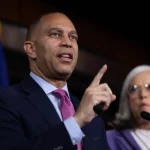
–>
March 3, 2023
The Dollar-For-Dollar Deficit Reduction Act proposed by elected Republicans is a sham. It requires the executive branch to propose spending reductions over a ten-year period for the same amount the debt ceiling is raised. Let’s consider some cases for a minute. The deficit spending in 2022 was almost $1.4 trillion.
‘); googletag.cmd.push(function () { googletag.display(‘div-gpt-ad-1609268089992-0’); }); }
In the first case, let’s assume the debt ceiling is raised by $1.4 trillion. This means the administration needs to have no spending reductions. And we continue to add to the debt by at least the $1.4 trillion.
In the second case, let’s assume the debt ceiling is raised by $0.7 trillion, or about half of the current deficit. This implies the administration will have to cut spending by $0.7 trillion, or $700 billion. But the cuts only have to be made over a decade. This means spending cuts only have to be $70 billion for the next year. Now, if the government otherwise would have run a $1.4 trillion deficit and spending for the year is reduced only by $70 billion, this means the deficit will be about $1.3 trillion. Before the fiscal year is out, the debt ceiling will have to be raised again.
In the third case, assume the debt ceiling is not raised at all. Assuming the administration cared to participate in the sham proceedings, this would imply cuts of $1.4 trillion need to be found, but only over a decade. So, this year, only $140 billion would have to be cut. But if we’re running a nominal $1.4 trillion deficit and this fiscal year’s budget is reduced only by $140 billion, then we can expect a deficit of about $1.25 trillion. In which case, we are squarely facing a debt ceiling crisis again.
‘); googletag.cmd.push(function () { googletag.display(‘div-gpt-ad-1609270365559-0’); }); }
It is instructive to notice the difference between candidate Republicans and elected Republicans. On the campaign trail, those Republicans talk tough. They recognize government spending creating deficits must be monetized by the Federal Reserve, which causes inflation. This inflation afflicts the poor and middle class most. If the wealthy notice inflation at all, it is more an inconvenience than an existential matter. Governmental deficit spending, caused by elected politicians, is the reason income differences between the poor and middle class versus the wealthy keep widening.
 Once elected, Republicans cannot identify any government program, commission, office, agency, bureau, department, or administration that should be eliminated. All parts of Leviathan become critically important. Leviathan must be carefully fed and nourished to continue phenomenal growth.
Once elected, Republicans cannot identify any government program, commission, office, agency, bureau, department, or administration that should be eliminated. All parts of Leviathan become critically important. Leviathan must be carefully fed and nourished to continue phenomenal growth.
Elected Republicans should insist on eliminating spending on specific government entities in exchange for raising the debt ceiling any amount. If the debt ceiling is raised by some amount, the current fiscal year should have the full and permanent spending reductions of the identical amount.
Obviously, elected Republicans need some help identifying where the scope and scale of Leviathan could be reduced. Perhaps they could remember that on the campaign trail, they were much more amenable to eliminating spending on Planned Parenthood, the Corporation for Public Broadcasting, the Consumer Product Safety Commission, the National Endowment for the Arts, Centers for Disease Control, the World Economic Forum, the World Health Organization, the World Bank, NATO, the United Nations, the Federal Bureau of Investigation, the Department of Homeland Security, the Bureau of Alcohol Tobacco Firearms and Explosives, the Environmental Protection Agency, the Department of Education, the Department of Commerce, the Department of Health and Human Services, the Department of Energy, and the Department of the Interior. And the Transportation Safety Agency should be privatized with costs borne by the airlines (which will be cost shifted to passengers).
To give some perspective how out-of-control federal spending is, if all these government entities had their spending permanently eliminated, the savings would approximately equal the deficit. This means we could balance the budget tomorrow if we had the political will.
Back in the day, the window was open, even if it was closing fast, to offer an option to workers for either keeping Social Security as it is now or else privatizing an account. But, although they controlled the White House, the Senate, and the House, Bush-Frist-Hastert blew the opportunity. Now, there is a window open, but closing fast, to balance the budget. If draconian permanent cuts are made, then the budget can be balanced keeping expenditures for paying interest on the debt, Social Security, and the Department of Defense. If the budget isn’t balanced, then we are facing much higher inflation in the future with much lower standards of living and less attractive opportunities.
‘); googletag.cmd.push(function () { googletag.display(‘div-gpt-ad-1609268078422-0’); }); } if (publir_show_ads) { document.write(“
The House of Representatives can get us to a balanced budget unilaterally in the next fiscal year. They don’t need either Senate or White House cooperation. Because appropriations originate in the House, all the House needs to do to cut spending is not appropriate the funds. All that’s required is the political will. Will elected Republicans blow this new opportunity, too?
The current charade with the debt ceiling is a dance with the Senate and White House because Democrats in the last Congress passed this fiscal year’s mammoth appropriations bill. To alter that bill requires collaboration.
Eliminating these expenditures permanently will go a long way to advancing liberty and prosperity. If Republicans are serious about aligning with parents, poor and middle-class workers, businesses interested in capitalist ventures producing goods and services people want, and senior citizens, then they need to get serious about spending. The current spectacle with the debt ceiling indicates elected Republicans aren’t serious.
Whitson G. Waldo, III is a capitalist, a venture capitalist, and master and skipper of a 43 foot monohull sloop-rigged sailing vessel.
Image: PxHere
<!– if(page_width_onload <= 479) { document.write("
“); googletag.cmd.push(function() { googletag.display(‘div-gpt-ad-1345489840937-4’); }); } –> If you experience technical problems, please write to [email protected]
FOLLOW US ON
<!–
–>
<!– _qoptions={ qacct:”p-9bKF-NgTuSFM6″ }; ![]() –> <!—-> <!– var addthis_share = { email_template: “new_template” } –>
–> <!—-> <!– var addthis_share = { email_template: “new_template” } –>






